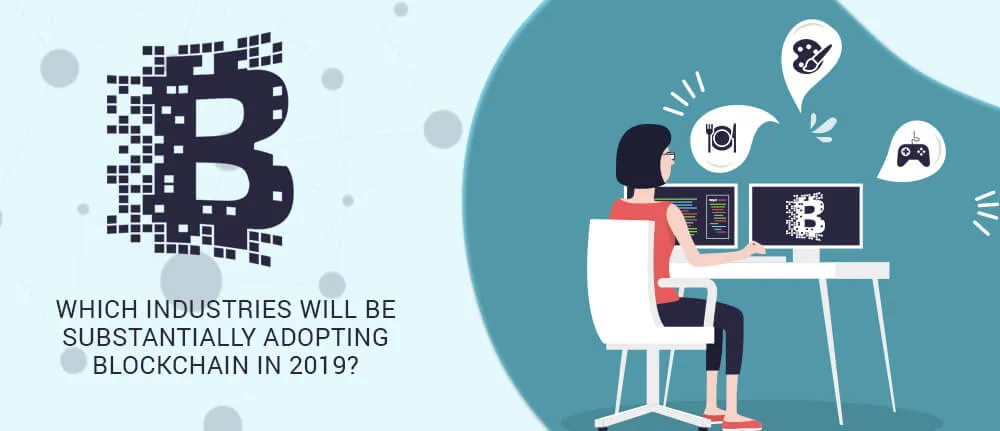4 Types of Healthcare Analytics with Examples & Success Stories
You already know how healthcare creates tons of clinical data every day. Patient visits… Labs… EMRs… doctor portals… scheduling systems… everything is generating numbers nonstop. But...
Listening is fun too.
Straighten your back and cherish with coffee - PLAY !

Previous year’s is challenging for blockchain world. The industry's implementation of this technology was less open-minded than expected. This had a lot to do with the crypto markets turbulence. Blockchain spending by companies has been slower than anticipated, while many continuing projects have been stalled or even halted.
In 2019, the Blockchain sector is anticipated to continue trying to work on its image and separate the company minds of blockchain from crypto. This in order to occur on a bigger scale blockchain adoption, it should be widely conveyed that blockchain technology can have countless use cases that are totally unrelated to cryptocurrencies.
There is a substantial amount of trapped value in logistics today, mainly due to the logistics industry's fragmented and competitiveness. With so many stakeholders engaged in the supply chain, this often results in low transparency, unstandardized procedures, data silos and a variety of technology adoption rates.
Many sections of the value chain of logistics are also linked to manual procedures that regulatory authorities require. For instance, to adhere to customs procedures, businesses often have to depend on manual data entry and paper-based paperwork. All of this makes it hard to monitor commodity provenance and shipment status as they move along the supply chain, causing global trade friction. Blockchain can possibly assist overcome these logistics frictions and make significant gains in the effectiveness of logistics processes. This technology can also allow information transparency and access between appropriate stakeholders in the supply chain, establishing a single source of reality. Furthermore, the confidence needed to communicate data between stakeholders is improved by the inherent safety mechanisms of blockchain technology.
In addition, by powering leaner, more automated, and error-free procedures, blockchain can attain cost savings. It can accelerate the physical flow of products as well as adding visibility and predictability to logistics activities. Provenance monitoring of products can provide a scale for accountable and sustainable supply chains and assist tackle counterfeiting of products.
Every year, there are lots of people in the world become ill due to foodborne diseases. Part of the reason we still see such statistics is because it takes far too long in the supply chain to isolate product recall or contamination problems. It was tracked in seconds with a blockchain track-and-trace solution.
For everyone in the sector, this technology is advantageous. When foodborne disease outbreaks happen, the restaurants or grocery stores that served the food are often left to wring their hands, promising to reach the bottom. But blockchain track-and-trace will assist them track impacted items to their origin instantly, rapidly locating the problem so that contaminated products can be removed from menus, racks, and supply chains.
It's pretty obvious how blockchain can benefit the arts, especially art buying and selling. It's a sector that depends on history of provenance and transactions, and blockchain suits that well. Not only does this increase the value of art buyers, but it also improves transparency in a sector not always known for being transparent.
The decentralized nature of blockchain makes it possible for artists and institutions, without involving a middleman, to deal directly with collectors and customers if they so choose.
The gaming industry's progressive attitude towards fresh technologies has resulted in the inclusion of blockchain into the games world. Blockchain technology can be seen as the next logical phase, driven by elevated rates of consumption and community engagement.
The decentralized nature of blockchain makes it possible for performers and organizations, without involving a middleman, to deal directly with collectors and customers when they so choose. Since gaming assets are nearly as essential and precious as concrete assets, the blockchain provides discernible evidence of provenance from particular virtual products. Blockchain digital tokens add enormous payment advantages, particularly for sports, generating indigenous in-game tokens and driving seamless transactions on decentralized exchanges.
In the future, Blockchain will revolutionize business processes in many Blockchain Consulting Companies.but it takes time and effort to adopt them. we can expect governments to end up accepting blockchain advantages in the near future and start using them to improve economic and public services. Blockchain will encourage individuals to gain fresh abilities, while traditional company will need to reconsider their procedures entirely.

You already know how healthcare creates tons of clinical data every day. Patient visits… Labs… EMRs… doctor portals… scheduling systems… everything is generating numbers nonstop. But...

Let’s keep it simple. In healthcare, trust, safety, and human dignity come first, no matter what solution you build. The same applies to AI. Today, it is everywhere, from clinics...

Let's keep it real. The whole point of building autonomous Agents is to cut manual work and keep focus on business. Approvals that used to take days can happen in hours because...